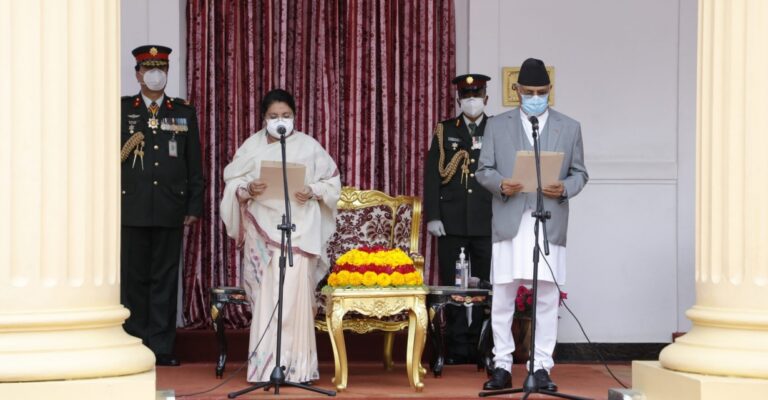
At the recommendation of Prime Minister KP Sharma Oli, President Bidya Devi Bhandari has started the process of forming a new government in less than 24 hours against the constitutional provisions.
Oli, who became the prime minister in accordance with Article 76 (3) of the constitution, has started the process of forming a new government in accordance with Article 76 (5) of the constitution without taking the vote of confidence or resigning despite being required by the law.
President Bhandari has given the members of the House of Representatives till 5:00 pm on Friday to come up with their majority claim.
According to Article 76 (3) of the constitution, Oli was sworn in as the prime minister for being the leader of the largest party in the House of Representatives on May 14.
Article 76 (4) of the constitution stipulates that the prime minister must take a vote of confidence within 30 days of being appointed.
However, Oli has decided to pave the way for the formation of a new government, arguing that there has been no change in the current political landscape.
“According to Article 76 (4) of the constitution, the prime minister must obtain vote of confidence from the House of Representatives within 30 days of appointment. However, the current political scenario doesn’t seem to be in favor of the incumbent government. As it is not appropriate to keep the country in limbo, it is only suitable to pave the way for the formation of an alternative government. So I request to start the process of forming a new government in accordance with Article 76 (5) of the constitution,” reads PM Oli’s letter to the President.
Less than two hours after receiving Oli’s letter, President Bhandari gave political parties a one-day deadline to call for the formation of a new government.
Constitutional experts say that the PM’s resignation, failure to obtain vote of confidence within 30 days of appointment and meeting the 30-day deadline are the three preconditions required by the law for initiating the process of forming a new government.
According to lawyer Lalit Basnet, the move by the president and prime minister is a direct interference in the country’s constitutional order.
“The Prime Minister recommended initiating the process of forming a new government without going through all the three preconditions and the President has blindly supported it,” he said.
“Not only is the prime minister’s move unconstitutional, but the President is complicit in this gross negligence of constitutional provisions. Moreover, the deadline give to parties to claim stake in the new government is eerily impossible to meet. This shows that the President and Pm have ill intentions,” said Basnet, who was also a legal adviser to then-president Ram Baran Yadav.
As per the constitution, Prime Minister Oli is required to test his power in the House of Representatives by seeking vote of confidence within 30 days of his appointment.
Senior Advocate Bipin Adhikari said, “The process of forming a new government starts when the existing PM resigns or s/he loses confidence of the House, neither of which has happened. In the parliamentary system, the existing government does not recommend to the president to initiate the process of forming a new government.”
At the same time, since Oli has not resigned yet, he has the prerogative to dissolve the House of Representatives in accordance with Article 76 (7) of the constitution.
Oli and his close associates have repeatedly stated that their only goal is to hold elections. UML standing committee member Subash Nemwang said that Oli was likely to become the prime minister even under the new process.
NEW ORDINANCES
Meanwhile, President Bhandari on Thursday issued two ordinances – related to oath–taking and COVID crisis management.
According to the Office of the President, Bhandari has issued the Oath Ordinance 2078 and the COVID-19 Crisis Management Ordinance 2078 on the recommendation of the Government of Nepal and the Council of Ministers in accordance with Article 114 (1) of the Constitution of Nepal.
Oli drew flak for not saying the words “I pledge” during his oath-taking ceremony after being appointed the prime minister for the third time.
The new ordinance states that person holding public office no longer has to make a ‘pledge’ when taking an oath of office and secrecy. The government has removed the word ‘pledge’ from the oath through the new ordinance.
“The Prime Minister was dragged into controversy when he was sworn-in. There is no federal law regarding the process of swearing-in hence the ordinance was introduced to bridge the legal gap,” said Law Minister Lilanath Shrestha.
Earlier, the then Vice-president Parmananda Jha had courted controversy after he took the oath of office and secrecy in Hindi. He had to take the oath again after the Supreme Court ruled that the swearing-in in Hindi was against the law.








